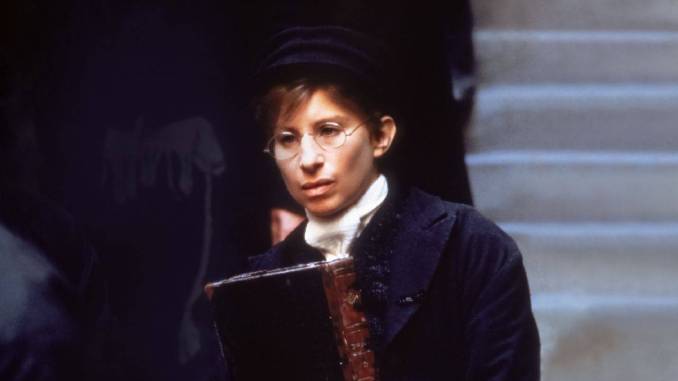Yentl at 40: Barbra Streisand’s Movie Musical as an Act of Faith

When Barbra Streisand erupted onto the scene in 1963, it felt like a cultural hurricane had swept in, scattering the old mode of musical stardom into abstraction. There was something electric in how unrehearsed she was, an exposed wire able to rewrite expectations with improvised deftness. In reality, her overnight success had been well-honed, built as a lifeline to sustain a young, misunderstood performer. For her, singing was the means, but acting—participating in moviemaking—was the ends. Her earth-shattering arrival onto the cultural scene was a well-executed escape plan. Streisand’s singular stage presence was a path away from a lonely upbringing in Brooklyn and towards something new and distinctly creative. As she admitted in her recently released memoir My Name Is Barbra: “I became a movie star, even though I didn’t fit the conventional image…who knows? Maybe I did will my vision into reality.”
It was this entrancing self-possession that prompted a reckoning. Like Ethel Merman and Judy Garland before her, Streisand reimagined the musical star, guided it into its next iteration, held in the singers’ imperfect warble. We now reflect on these cultural shifts with a stark kind of religious certainty—like the events before and after had rendered them inevitable. Streisand’s success is framed as such. But her eventual shift to directing movies was cast in an infamously bad light, with each project treated as the embodiment of an unchecked ego, none more so than her directorial debut Yentl. Yentl is an act of faith, a plea for her audiences to remain faithful despite the changing tides. It was a first-time director embracing a grand, emotionally demanding story—complicating her frictionless progression through Hollywood with the 15-year struggle to get Yentl made.
Following Yentl (Streisand) in the wake of her father’s (Nehemiah Persoff) passing, Yentl watches as she undergoes a dramatic reinvention, cutting her hair and adopting the moniker of Anshel to pursue student-hood disguised as a man. Streisand, unsurprisingly, was interested in the obstacles which restrict Yentl, undermining her will to learn. Perhaps more surprisingly, her pursuit of the story was also guided by her relationship to faith in the wake of her own father’s early death, only a few months after her first birthday.
Musicals are an exercise in framing and perspective, and Streisand uses the genre here to embolden the story’s themes and ideas through music’s elusive potency. Depending on the movie musical, songs will be embedded into the production, with singing acting as a mode of communication that goes unremarked upon (think Les Misérables or West Side Story) or music will be explained in the context of the setting (think Singin’ in the Rain or Cabaret). Yentl bypasses such containers, enacting something pricklier and more intimate in its structure.
The film’s detractors dismiss its musical framework as proof of Streisand’s self-interest: Yentl not only holds the story together, but serves as the lone musical voice. Even though the Tony-winning Mandy Patinkin is the co-lead, every number is relegated to Yentl’s mind, confined to the inner corners of her identity.
-

-

-

-

-

-

-

-

-

-

-

-

-

-

-

-

-

-

-

-

-

-

-

-

-

-

-

-

-

-

-

-

-

-

-

-

-

-

-

-








































